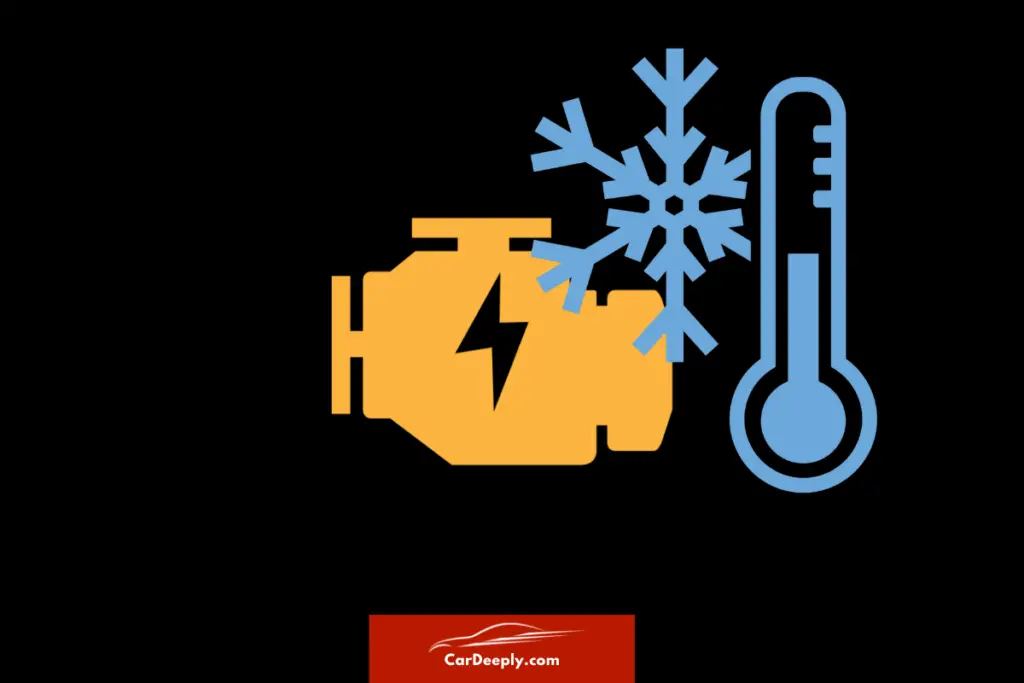Ever been stranded in the cold due to a stubborn ‘check engine’ light?
It’s a nightmare you’d rather avoid. This article is your shield against such mishaps, offering:
- Insight into cold-weather engine issues
- Practical answers to common problems
- Proactive measures for prevention
Don’t let the cold weather turn your car into a frozen, immobile hunk of metal. Dive in, and let’s conquer the winter together!
Advertising links are marked with *. We receive a small commission on sales, nothing changes for you.
Key Takeaways

- Cold weather can affect your car’s engine, causing the oil to thicken and fuel lines to clog.
- Common causes of the check engine light in cold weather include faulty sensors and dirty air filters.
- A scanner can help diagnose why the check engine light is on.
- Regular checks on the oil level and quality and regular servicing can help maintain your engine in cold weather.
- Ignoring the check engine light, even if it only comes in cold weather, can lead to serious problems.
The Impact of Cold Weather on Your Car’s Engine
When winter rolls around, your car’s engine feels the chill just like you do. It’s not just about starting your car in the morning, and it’s about how the engine performs in the cold.
The Cold’s Effect on Engine Operation
Cold weather can be a real party pooper for your engine. It makes the engine oil thicker, so it doesn’t flow as smoothly. This can cause friction and wear on the engine parts.
The Role of Engine Oil in Cold Weather
Engine oil is like the lifeblood of your car. It lubricates the engine parts and keeps them running smoothly. But when the temperature drops, the oil can become thick and sluggish. This can lead to increased friction and potential damage to the engine.
The Impact on Fuel Lines
Cold weather can also play havoc with your car’s fuel lines. It can cause the fuel to thicken and clog the lines, leading to poor engine performance.
Common Causes of Check Engine Light in Cold Weather
So, you’re bundled up in your warmest coat, but your car’s check engine light is still on. What gives? Here are some common culprits:
Faulty Oxygen Sensor
The oxygen sensor measures the amount of oxygen in your car’s exhaust gases. If it’s faulty, it can cause your engine to burn more fuel than necessary.
Faulty Catalytic Converter
The catalytic converter reduces harmful emissions from your car’s exhaust. If it’s not working properly, it can cause your check engine light to come on.
Faulty Mass Air Flow Sensor
The mass air flow sensor measures the amount of air entering the engine. If it’s not working correctly, it can cause your engine to run rich or lean, leading to poor performance.
Faulty Spark Plug
A spark plug not firing properly can cause your engine to misfire, triggering the check engine light.
Faulty Ignition Coil
The ignition coil provides the spark that ignites the fuel in your engine. If it’s faulty, it can cause your engine to misfire.
Dirty Air Filter
A dirty air filter can restrict airflow into your engine, leading to poor performance.
Leaking Fuel Injector
A leaking fuel injector can cause your engine to run rich, triggering the check engine light.
Faulty Throttle Position Sensor
The throttle position sensor monitors the throttle position of your car. If it’s not working correctly, it can cause your engine to run poorly.
Remember, these are just some of the potential causes. If your check engine light comes on in cold weather, it’s best to get it checked out by a professional. They can diagnose the problem and recommend the best course of action.
How to Respond When Your Check Engine Light Comes On
So, your check engine light is on. Don’t panic! Here’s what you can do:
Using a Scanner
A scanner is a handy tool to help you figure out what’s happening. It reads the error codes from your car’s computer and tells you what the problem might be.
Manual Methods
You can still do detective work if you don’t have a scanner. Check your car’s manual for information on what the light might mean.
Remember, it’s always a good idea to consult with a professional if unsure. They have the tools and knowledge to diagnose and fix the problem.
Maintaining Your Engine in Cold Weather
Cold weather doesn’t have to be a death sentence for your car’s engine. Here are some tips to keep it running smoothly:
Regular Checks on Oil Level and Quality
Ensure your engine oil is at the right level and in good condition. This can help prevent friction and wear on the engine parts.
Importance of Regular Engine Servicing
Regular servicing can help catch potential problems before they become major issues. It’s like a health check-up for your car.
Tips on Expanding the Life of an Engine
Want to keep your engine purring for longer? Here are some tips:
- Keep your engine clean
- Use the right oil
- Don’t ignore the check engine light
Frequently Asked Questions
Can a low battery cause the check engine light to come on in cold weather?
A low battery can trigger the check engine light, especially in cold weather. The battery might struggle to provide enough power, leading to various sensor malfunctions and activating the light.
Does warming the car before driving help prevent the check engine light from coming on?
Warming up your car before driving can help the engine oil circulate better, reducing the risk of the check engine light coming on. However, it’s not a guaranteed solution and should be combined with regular maintenance.
Can I ignore the check engine light if it only comes on in cold weather?
Ignoring the check engine light is never a good idea, even if it only comes on in cold weather. It’s a sign that something is wrong; ignoring it could lead to more serious problems.
What should I do if the check engine light comes on and it’s too cold to go to a mechanic?
If it’s too cold to go to a mechanic, you can use a scanner to read the error codes. This can give you an idea of what the problem might be. However, consulting with a professional as soon as possible is still recommended.
Can the check engine light come on due to cold weather even if there’s nothing wrong with the car?
While the check engine light can come on due to cold weather, it’s usually a sign that something is wrong. The cold weather is exacerbating an existing issue. It’s best to get it checked out to be sure.
Conclusion
Cold weather can be tough on your car’s engine, but with the right knowledge and care, you can keep it running smoothly. So, don’t let the cold get you down. With these tips, you can conquer the winter and keep your car in shape.
Remember, a well-maintained car is a happy car!

Sebastian loves convertibles and drove a BMW 335i for a long time (325 hp is just a dream). Today, with two children, he is more concerned with SUVs and family-friendly vehicles. In addition to an Audi A4 Avant, he also drives a Cupra Formentor VZ – even as a family man, you can’t do without speed. Get to know Sebastian better and visit the About Us page.
Advertising links are marked with *. We receive a small commission on sales, nothing changes for you.
